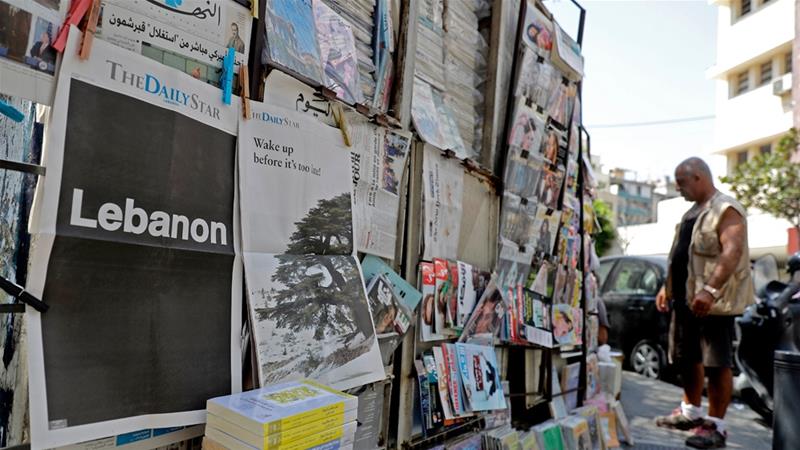Home » Middle East »
Lebanon's Daily Star employees on strike, citing unpaid salaries
Over a dozen members of staff at English-language daily do not go to work after not being paid for months.
Beirut, Lebanon – Members of staff at Lebanon’s The Daily Star newspaper have gone on strike, saying salaries had gone unpaid for months.
More than a dozen reporters and editors at the English-language daily did not go to work on Thursday. Some said they had not been paid in nearly six months despite working full-time.
More:
-
Lebanon pays $1.5bn debt to ease financial tension
-
Who can lead Lebanon out of political crisis?
-
Lebanon’s Saad Hariri says he does not want to be next PM
“First it was a week, then two, then a month,” said Timour Azhari, a reporter at The Daily Star and one of those on strike. “Then suddenly we went for two or three months without anything.”
“We’ve had promises saying the money is coming, we’re working on getting the money… but in the end, we have no money,” he said. “So we’ve been pressuring, we’ve been holding meetings, we’ve been asking, sending emails. But generally we felt that our demands were not getting through.”
Employees last week had warned management of the impending strike, submitting a document asking for one month’s salary to be paid by Wednesday, and for a schedule to be drawn up for the rest of the outstanding payments. The newspaper’s editor said it was unable to meet these demands.
“Yes, we have a cashflow problem; yes, salaries have been somewhat delayed, that of course is true,” Editor-in-Chief Nadim Ladki told Al Jazeera.
“We are doing as much as we can to resolve the situation. But, as you know, the newspaper industry around the globe is facing challenges, so we are part of that.”
Ladki said employees could ask the company accountant to pay small sums in emergency circumstances on a case-by-case basis. Staffers said this system helped them to survive this long, with one likening the process to asking employees to “beg for our salaries”.
Previous promises to pay wages soon had gone unfulfilled due to Lebanon’s anti-government protests, which have been ongoing for six weeks, having disrupted the banking system and driven down advertising sales, Ladki said.
“I’m not saying the staff are not within their rights to demand the full amount, and of course this is the duty of the paper. But there are circumstances that have really not helped us.”
‘You’re fired’
As staffers met on Wednesday afternoon to decide whether or not to proceed with the strike, long-time employee Benjamin Redd received an email from management telling him it was his last day at the newspaper: He was being let go due to financial constraints.
“At the end of my shift I got an email basically saying you’re fired, get out, don’t come back … on the eve of the strike,” Redd said.
“I don’t believe it was just a financial decision. The timing is very convenient.”
The consensus among staff was that Redd had been fired for appearing to lead calls for a strike, according to Azhari, who submitted his resignation on Thursday, citing Redd’s dismissal.
“Management seemed to think that he had taken on a leading role, which I must stress is not true,” he said.
“It really was democratically by consensus, with all staff members, but somehow they got the impression that he was leading it and he was fired for that.”
Staff said if management had intended firing Redd to dampen calls for a strike, it had the opposite effect.
“[It] was the trigger for a lot of the people who went on strike today, because it came very much out of the blue, and it appeared to be in response to Ben’s role in helping organise this action,” said one current staffer taking part in the strike, who asked to remain anonymous as they feared jeopardising their job following Redd’s dismissal.
“We just weren’t convinced that it was done in good faith.”
“It was a clear tactic of intimidation coming from upper management … and I received that message as a clear threat,” said another.
Ladki insisted Redd was let go solely for financial reasons, but acknowledged that the timing was unfortunate.
“Ben was on a high salary and high expenses … so the idea was that for his salary, I can get three or four younger journalists, that was the decision,” Ladki said. “The timing looked very bad, yes.”
Several staffers at The Daily Star confirmed to Al Jazeera on Thursday that they had resigned or planned to do so imminently. One said they had been thinking about leaving over the pay issue, but Redd’s firing “was the last straw”.
Tens of employees have left the newspaper in recent months thanks to payment issues, leaving it severely understaffed.
The Daily Star is almost entirely owned by the family of Lebanon’s caretaker prime minister, Saad Hariri.
Employees of several media companies owned by the family have consistently gone unpaid. In September, Hariri announced the suspension of operations at Future TV, once one of Lebanon’s most-high profile channels, citing financial difficulties.
At the time, the majority of the station’s 380 staff had been on a weeks-long strike after going unpaid for months.
Inside Story
Who can lead Lebanon out of political crisis?
Source: Read Full Article




